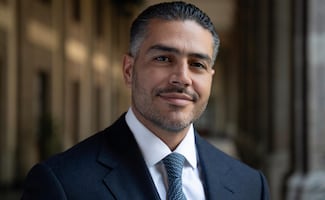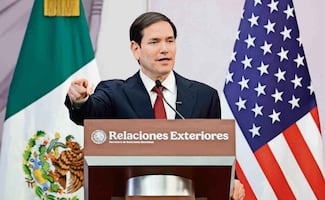Más Información

New York Times destaca rol de Harfuch en el combate del narco; resalta intercambio de inteligencia con EU

Marco Rubio destaca labor de seguridad de México; "están haciendo más que nunca en su historia", afirma

"Queremos cerrar este capítulo", dice Salinas Pliego al SAT; esperarán a enero a conocer fundamentos legales de adeudo fiscal
Visiting a battleground state he can't afford to lose, Donald Trump promised Hispanics "a much better life" on Wednesday in a Florida speech that continued his recent effort to soften his tone and broaden his support 11 weeks before the presidential election.
The Republican presidential candidate also repeated his promise to build a wall along the U.S.-Mexican border to keep out immigrants, underscoring the tricky balancing act he faces in retaining backing from conservatives while beckoning to moderates for their votes.
"I am going to fight to give every Hispanic citizen a much better future, a much better life," Trump told a rally in Tampa as polls show him trailing in the critical state. "You have the right to walk outside without being shot. You have a right to a good education for your child. You have the right to own your home. You have the right to have a good job."
Trump dominated presidential campaign coverage for the day as his Democratic rival, Hillary Clinton, was fundraising in California.
Her drive for the White House got a rhetorical boost when her defeated competitor for her party's nomination, Vermont Sen. Bernie Sanders, told The Associated Press that he'll campaign actively for Clinton this fall. Sanders, who turns 75 on Sept. 8, also said he's leaning toward seeking re-election as an independent senator in 2018.
Trump's appeal to Hispanics largely echoed his recent outreach to African-Americans. He rarely tried to explicitly lure minority voters during his unlikely rise to the GOP nomination earlier this year.
Now facing a bigger electorate, Trump suggested that Hispanics have been taken for granted by Democrats. He said the 600,000 Latino-owned businesses in Florida would benefit under his economic plan, but he offered few specifics.
"Hispanics are tired of being used by these phony politicians," Trump roared above the rumbles of a thunderstorm audible inside. "I say, what do you have to lose? I will fix it."
Hispanics make up a sizeable and growing percentage of Florida's population. Trump will have a narrow path to the White House without winning the Sunshine State, where he owns several resorts and which he dubbed "his second home" on Wednesday.
Trump made no mention at the rally, largely attended by white supporters, of his remarks Tuesday that he would consider "softening" laws dealing with immigrants in the country illegally.
That is a far cry from the early days of the GOP primaries, when Trump vowed to use a "deportation force" to round up and deport the millions of people living in the country illegally.
Trump was holding a rally later Wednesday in Jackson, Mississippi, an overwhelmingly African-American city. Reliably red Mississippi is an unusual general election campaign stop, and news of Trump's visit was greeted with skepticism by Rep. Bennie Thompson, a Democrat who is the only black member of Mississippi's congressional delegation.
"If you're going to talk to African-Americans about how your policies would improve their lives ... you need to go to those organizations that are predominantly African-American in membership or you go to those communities where African-Americans live," Thompson said.
Trump aides confirmed that he will tour churches, local businesses and charter schools in black and Hispanic urban neighborhoods. Dr. Ben Carson, a close ally and former GOP primary rival, said he will accompany Trump on at least one visit.
One of Trump's most reliable allies made plans to aid him this fall. The National Rifle Association's political victory fund has reserved about $2.7 million in TV commercials in September and October, Kantar Media's political ad tracker shows. The NRA is focusing on swing states Ohio, North Carolina and Pennsylvania.
Noticias según tus intereses
[Publicidad]
[Publicidad]











